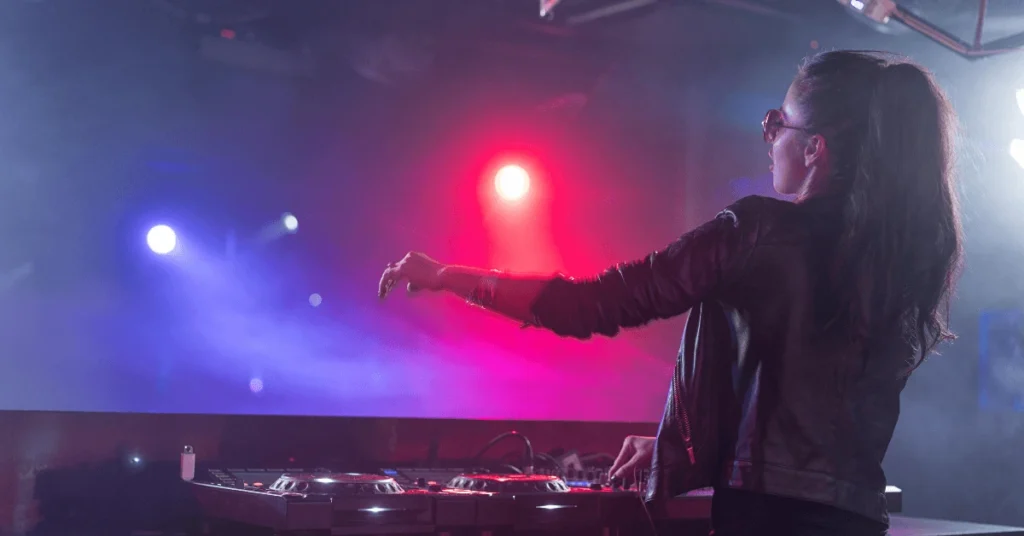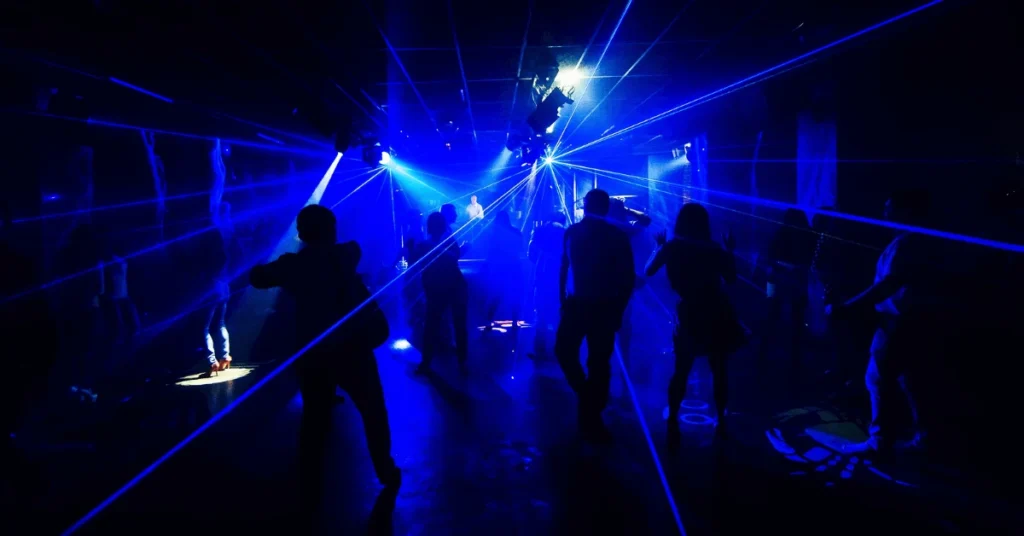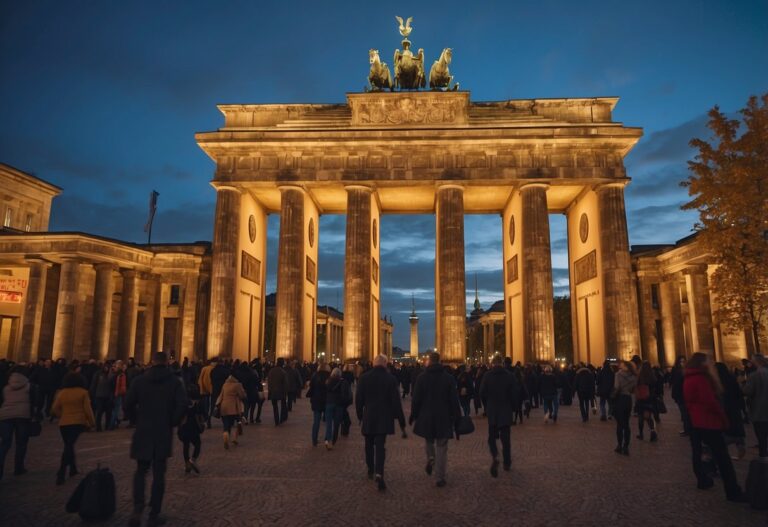Berlin’s techno labels are at the heart of the city’s iconic electronic music scene, shaping its nightclubs and global reputation. More than just music producers, these labels are key players in nurturing the underground techno movement, offering unique sounds that captivate dance floors worldwide. This guide delves into the legendary and emerging Berlin techno labels, revealing how they continue influencing the city’s vibrant nightlife and techno culture. Discover the labels that define Berlin’s techno scene and how they contribute to its status as a global techno hub.
History of Berlin Techno
In the heart of Europe, a revolution blossomed in the late ’80s as Berlin techno labels emerged from the shadow of the Berlin Wall’s collapse. This new wave of music fused the raw energy of punk, goth, and industrial sounds with the electronic beats of techno. At night, the city transformed into a pulsating hub where reverberating electro rhythms became the heartbeat of a reunified Berlin.
Key Developments in Berlin Techno:
- Late 1980s: Entry of techno into West Germany from Detroit.
- Early 1990s: Rise of underground clubs and illegal raves in abandoned buildings.
- Cultural Impact: Invigorated by techno, the youth cultivated liberty and expression.
During the ’90s, the scene was unrecognizable from traditional tunes, instead favoring relentless innovation. Once desolate spaces became homes to some of the most influential Berlin techno labels, each carrying the essence of Berlin’s gritty history. Labels like Tresor and Basic Channel were more than music producers; they were icons symbolizing freedom and cultural rebirth.
By intertwining dissonant remnants of the past with futuristic vision, Berlin techno labels crafted a genre that was not just heard but deeply felt. They celebrated sonic exploration, where beats and basslines told stories of newfound unity. This movement wasn’t confined to Berlin; it rippled across the globe, leaving an indelible mark on electronic music culture everywhere.
Influential Berlin Techno Labels
Berlin’s pulsating heart beats in sync with the rhythm of techno. At the core of this vibrant scene are the influential Berlin techno labels that have become synonymous with the city’s cultural identity. They are the curators of beats reverberating through iconic clubs’ walls and across the global electronic music landscape.
Tresor Records, established in 1991 in conjunction with the legendary Tresor club, is a historical pillar in the techno community. Not only has Tresor released a multitude of influential records, but it has also been instrumental in defining Berlin’s famous stark, warehouse-style sound.
- Ostgut Ton, born from the same visionary minds behind Berghain, has meticulously crafted a sound and reputation that mirrors the club’s enigmatic presence. This label champions a sound that is avant-garde yet accessible, pushing the boundaries of electronic soundscapes.
- The ground-breaking labels list continues with Watergate Records, the offspring of the Watergate Club, which overlooks the Spree River. Known for its forward-thinking releases, Watergate Records embodies the diversity within the Berlin techno space—always evolving, never stagnant.
These entities foster a community that is at once tightly-knit and internationally expansive, radiating the essence of Berlin to every corner of the world. Each label has carved out its unique space in the city’s history, contributing to the dynamic narrative of Berlin techno. Together, they encapsulate the spirit of innovation that makes Berlin’s techno culture truly one of a kind.

Key Artists and DJs
Pioneering Techno DJs
The Berlin techno scene is rife with groundbreaking DJs significantly influencing the genre. Prominent among them, Ben Klock stands as a paragon of Berlin’s techno vanguard. Honing his craft at the legendary Berghain club, Klock’s precision and ability to intertwine hypnotic grooves with pulsating rhythms have earned him a revered spot in techno’s hall of fame.
Another revered group known for its electrifying performances and innovative soundscapes is Modeselektor. Its unique blend of techno, infused with elements of hip-hop and electro, has made it one of the most dynamic acts emerging from Berlin’s robust scene.
Influential Producers
Berlin techno labels have been a launchpad for some of the industry’s most cutting-edge talents in terms of production. These producers have taken Berlin’s distinctive sounds and transmitted them worldwide, continuously pushing the boundaries of electronic music.
Modeselektor, wearing multiple hats as both DJ and producer, illustrates the capacity for innovation from within the Berlin techno labels community. Their production work is a testament to the creative potential and forward-thinking ethos that infuses the techno scene in Berlin.
Music and Genre Evolution
Berlin techno labels have been pivotal in the electronic music landscape, fostering diverse sounds that reverberate through the city’s vibrant scene. They encapsulate the evolution from classic techno and electro beats to the industrial grit and ambient soundscapes that define the genre’s history. These labels have not just released music; they’ve ritualized the experience of sound, creating communities around innovative hard techno, glitch, and soul-infused techno tunes.
- Techno is the backbone of Berlin’s electronic scene. It emphasizes a repetitive beat structure paired with futuristic and machine-like sounds.
- Electro: This genre meshes with techno, adding a funkier, robotic feeling to the rhythm, embodying the electronic renaissance of Berlin.
- Industrial: Harsher and noisy, it’s the raw edge of Berlin techno, mirroring the city’s stark and intense history.
- Ambient: A softer contrast to industrial sounds, providing a dreamy and atmospheric layer to techno tracks.
An enthusiastic exploration of new and hybrid sounds marks the progression within Berlin techno labels. Take Ostgut Ton, for example, which has been at the forefront of keeping the Berlin techno scene fresh and unique through relentless innovation. These labels have not only played a role in the technical aspects of music production but have also given life to genres like:
- Hard Techno: An aggressive sub-genre known for its powerful and uncompromising sound.
- Glitch: Incorporating sonic hiccups and digital artifacts to create rhythm and melody.
- Soul: Occasionally, a soulful twist is interspersed, softening the edges of techno and bringing warmth to the genre.
Labels like Tresor to Berghain have become synonymous with Berlin’s musical identity, curating and evolving aural experiences that resonate with the global techno community. Through their dedication, Berlin techno labels continue to innovate and inspire.

The Berlin Rave Scene
Rave Culture: Core of the Community
- Local and international Ravers flock to Berlin for its iconic techno scene.
- A spirit of freedom and experimentation underpins the community.
- Labels like Ostgut Ton are synonymous with the city’s musical identity.
Key Events Shaping the Scene:
- Influential clubs like Berghain set the stage for extended dance experiences.
- Smaller, underground events across the city provide diverse soundscapes for discerning listeners.
Each space pulses to a unique rhythm, fuelled by visionary musicians and an audience eager for exploration. The labels and the artists behind them continuously push boundaries, ensuring Berlin remains a global techno touchstone.
Berlin’s Influence on Global Techno
Techno in Japan
Japan absorbed Berlin’s innovation, with Tokyo clubs pulsating to techno beats. The city’s Womb and Contact are havens for aficionados, often featuring Berlin artists, thus knitting a tight connection that has infused Tokyo’s electronic scene with Berlin’s distinctive sound.
Techno in Mexico
Mexico’s burgeoning techno scene is laced with the influence of Berlin. Mexico City’s AM Local and Bar Americas in Guadalajara regularly celebrate diversity with line-ups reminiscent of Berlin’s own club culture, fostering a vibrant nexus where the German capital’s musical exports are highly revered.
Techno in Italy
In Italy, the influence is tangible as Berlin-based DJs frequently headline at clubs like Rome’s Goa Club or Milan’s Dude Club. These venues echo the minimalistic yet richly textured sound that Berlin techno labels have championed since the genre’s inception.
Techno in Scotland
With its enthusiastic embrace of electronic music, Scotland sees cities like Glasgow and Edinburgh mirroring Berlin’s underground ethos. The Sub Club and The Liquid Room, with rosters peppered with Berlin’s techno stalwarts, showcase the genre’s raw power and innovative edge that Berlin is known for.

Record Shops and Distribution
Local Berlin Shops
Hard Wax stands out as a legendary hub for techno enthusiasts, offering an extensive selection of music including releases from cutting-edge Berlin techno labels. This shop not only sells records but is also a key part of the distribution network, fostering the city’s electronic music culture by featuring a variety of techno subgenres. Likewise, Dodo Beach East, renowned for its historical roots, caters to various tastes within electronic and world music, harboring rare and second-hand finds.
Online Marketplaces
In the digital realm, Bandcamp has emerged as a prominent online marketplace supporting independent artists and labels. Berlin techno labels utilize Bandcamp for digital sales and merchandising vinyl, offering global access to Berlin’s distinctive techno sound. Additionally, platforms like Advanced, a label and music agency, provide techno aficionados worldwide with an array of records from Berlin’s underground scene. These online spaces complement local shops, ensuring that the pulse of Berlin techno resonates beyond its borders.
Culture and Arts Integration
Berlin techno labels have become synonymous with the city’s cultural fabric, weaving together the vitality of the arts with the pulsating techno scene. These labels do not merely release music; they foster community and embody the city’s love for techno as an art form.
Key Aspects:
- Community Engagement
- Artistic Expression
- Integration with Berlin’s Identity
Community Engagement:
Techno labels in Berlin are more than music producers; they are community cultivators. They often host events that merge various art forms, offering visual artists, designers, and musicians a platform to collaborate. This union celebrates creativity and inclusivity, solidifying the music as a pivotal part of Berlin’s social fabric.
Artistic Expression:
- Collaborative Projects: Berlin labels collaborate on installations and performances that combine sound with visual spectacles.
- Album Artwork: They invest in distinctive artwork that reflects the ethos of their music, thus contributing to the overall aesthetics within the art community.
Integration with Berlin’s Identity:
The love for techno music shared by Berlin’s citizens has transformed local labels into custodians of the city’s cultural heritage. As a result, some initiatives have been pushing for recognition of Berlin’s techno scene as part of UNESCO’s intangible cultural heritage to honor the genre’s unifying influence on the city since the fall of the Berlin Wall. Techno music and its labels are interlaced with the city’s history and continue to influence its dynamic cultural landscape.

Label Management and Production
When diving into the world of Berlin techno labels, one is met with a cosmos of meticulous label managers and producers. They collectively serve as the backbone of this electronic music juggernaut. Here, the raw energy of industrial beats becomes a polished auditory experience, ready to pulsate through the city’s legendary nightclubs.
- Label Managers are the orchestrators behind the scenes, ensuring the label’s vision aligns with each release. They coordinate with artists, oversee marketing strategies, and manage distribution channels. These individuals are pivotal in maintaining the label’s reputation for quality and innovation.
- Producers are the creative force crafting the distinct sounds for which Berlin techno is revered. They blend the mechanical precision of industrial components with the fluidity of electronic music, resulting in tracks that are both cutting-edge and timelessly entrancing.
| Role in Label | Functions |
|---|---|
| Label Manager | Strategic planning, artist coordination, market analysis |
| Producer | Music creation, sound design, audio engineering |
These catalysts of the Berlin techno scene work harmoniously, translating underground rhythms into a global language. Their combined efforts sustain the genre and propel it forward, keeping Berlin at the forefront of the electronic music landscape.
Networking and Community
Amid the pulsating beats of the German capital, Berlin techno labels have become synonymous with a vibrant community. They foster deep connections through music, creating a tapestry of events that champion the sounds of the underground. The techno scene here isn’t just about the tracks; it’s about the love and collaboration that thrives among artists, fans, and promoters.
Events serve as the lifeblood, bringing disparate factions together under one roof—or, more accurately, in one warehouse. They are the converging points where new music is heard, artists are celebrated, and friendships are formed. The techno spirit echoes through these gatherings, amplifying a sense of belonging.
- Building Relationships
- Labels host and sponsor gatherings
- Opportunities to collaborate
- Share resources and knowledge
Despite its global reach, the Berlin techno community remains tightly knit, with labels often acting as the glue. They are the champions of new talent, nurturing passion into careers. It’s a network that sees value in unity, where experienced mentors guide up-and-comers through the intricacies of the music industry.
The love of techno reverberates through these connections, solidifying the bond between label, artist, and listener. Ultimately, it’s a collective effort, a shared journey, with each label contributing to the city’s famed soundscape. Berlin’s techno community continues to thrive on the devotion of its participants, united by their love for the beat.

Frequently Asked Questions
What is the Berlin based music label?
A notable Berlin-based music label is Ostgut Ton, associated with the Berghain club, and focuses on techno and electronic music.
What are the 90s techno labels?
Famous 90s techno labels include Tresor Records (Berlin), Warp Records (UK), and R&S Records (Belgium), all pivotal in defining the techno sound of the era.
Is Berlin known for EDM?
Yes, Berlin is renowned for its electronic dance music (EDM), especially techno, with clubs like Berghain and Tresor, and events that attract a global audience.
Why is techno so big in Berlin?
Techno is big in Berlin due to its history of reunification and cultural freedom, providing a space for expression and innovation in music, and fostering a unique club culture that celebrates diversity and inclusivity.
If you liked this blog post about the topic: Berlin Techno Labels, don’t forget to leave us a comment down below to tell us about your experience with it.






